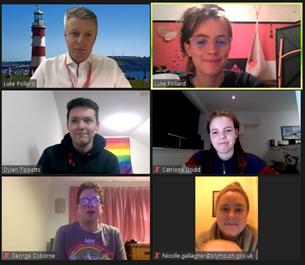Luke Pollard MP Member of Parliament for Plymouth Sutton and Devonport

To ensure that Luke understands the issues facing young people in Plymouth during coronavirus, Luke has been hosting a series of zoom sessions, ‘Youth Voices for Change’. The first two events, for under 18s and 18-25s respectively, brought together a few dozen young people across the city to discuss key topics and areas of support.
Luke says:
“2020 and the pandemic has undoubtedly been hard on everyone, but young people have been one of the groups that have been impacted the most. We heard how many are feeling isolated and like they and their friends have been abandoned and thrown under the bus. It was really informative to hear all the young people’s views and what they would like me and the government to do to support them.”
An overarching theme of the feedback was how isolated young people feel, from their friends, family, and other support networks. Luke heard that while many found the second lockdown easier as they could see their friends in school, others grappled with feelings of fear and anxiety about being forced to put themselves at risk of infection in such a high-populated place.
Those who had been in a bubble that had to isolate commented on the lack of support they received from their schools and from the government, especially concerning their mental health. This was a major theme in both sessions: young people’s mental health has been seriously harmed by the virus, and those networks that were already stretched thin before the pandemic are now completely unable to cope and contact those who need it.
This was especially highlighted for those in different groups, such as young carers and disabled people. These groups have had an especially tough time and a few people commented on how disheartening it was for teachers and other authority figures to not appreciate their struggle and isolation.
It was generally acknowledged that the uncertainty around the rules and their future further perpetuated mental health issues. They are finding it very difficult to know what they can and can’t do, and impossible to even try and plan any sort of future. Everyone agreed that this is adding to the anxiety they are already experiencing from the virus.
This was especially true for students who are due to take exams in the next year. Following so many U-turns by the Government, Luke heard that young people are fed up with last minute changes and want the government to be clear and the get the policy right from the start. Young people invest so much time and energy into revision, and the concern that it will all be for nothing is in some cases overwhelmingly disheartening. Some of the young people commented that it has also meant many students are struggling to find the motivation to even start revising, as it might have no use.
There were worries about the possible inequity of exams that do take place. Many students and their bubbles have had to isolate two or three times, missing at least a month of learning, while students in other schools have faced no such interruptions. Even for the content that was taught remotely, many expressed a lack of confidence in it, and an anxiety that their final grade will reflect more the lack of face-to-face teaching, rather than their own skills and work ethic.
Had Gavin Williamson been on the call, the young people said they would have pleaded with him ‘to act kindly and not conveniently’. What might be the easiest thing to do, they said, is not necessarily the best for them. They supported a radical or significant change to the system. While they
understood to some extent that the government’s response to the summer exams reflected that they were short on time, they have had all year to make the upcoming assessments much fairer and more reasonable. Plymouth’s young people expect that to be shown in their exam methods and in their grades.
For the slightly older students, the uncertainty of rules and future restrictions was also a major contributor to feelings of anxiety. University and college students expressed their feelings of isolation, forced into their halls or private houses, unable to meet any course mates or friends.
Luke heard that these frustrations are perpetuated by the fact they are paying the same amount for their degree, and not only can they not access the same services with nearly all their teaching taking place online, their student life and employment opportunities have been hit. The inability to work, go out and do the things that a young adult would normally do was a major grievance. The forced closure of pubs and bars has meant that that people can’t earn as they normally would, and also has eliminated chances of a normal university social life.
Finally, Luke heard frustrations from young people of all ages regarding the way they have been blamed for rising infection rates, despite being forced to go to school and college, move into mixed student accommodation, and primarily work in hospitality. The latter point was especially aggravating, after the government channelled nearly £1 billion paying for the public’s meals with the “eat out to help out” scheme.
Luke says:
“I want to thank all the young people who shared their views with me. It was really good hearing from such a range of views and from young people from Year 7 to students. It is really important we give our young people the support they need in the current crisis. This ranges from increased funding for youth mental health services, which I have been arguing for since my first day as an MP, to clear and concise Government communication, without the constant U-turns we have seen so often in the last year.”
